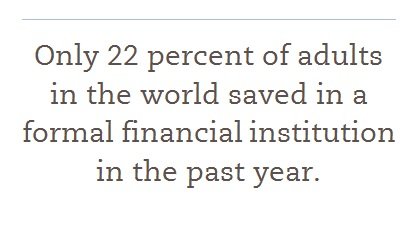Read the Roadmap below or download a PDF version here.
Have something to say? Share your thoughts and comments at the bottom of the page.
The Main Idea: |
|
Financial capability is about motivating and supporting consumers to make sound financial decisions. Attention to financial capability is essential for successful financial inclusion initiatives. |
Providers and policymakers have strong interests in a financially capable clientele. The scale of the need means that many actors are welcome, including providers, governments, non-profits, schools and others. |
Behavioral research reveals that people who know don’t always do (that is, act in their own best interests). It is important to test and design interventions that use insights from research to support positive behavior. |
Financial capability develops through “learning by doing.” There is a unique and enormous opportunity to deliver targeted financial capability messages at the very times customers are making decisions. |
Technology offers exciting opportunities to give customers financial capability messages at large scale and low cost through diverse platforms such as mobile messages and mass media. |

Financial capability is an essential ingredient of financial inclusion. Without it, clients may fail to take advantage of valuable financial services or be harmed by misusing them. Providers benefit from financially capable clients who actively and responsibly use services. Our goal is to ensure that clients are able to benefit from the expanded access to financial services that they are likely to experience in the coming years.
We define financial capability as:
The combination of knowledge, skills, attitudes and ultimately behaviors that translate into sound financial decisions and appropriate use of financial services.
The working group’s vision of a financially capable individual is someone who can affirm the following:
|
|
The working group examined some of the most important challenges in the area of financial capability by asking:
- How do people become financially capable in their normal lives?
- What methods work best to build financial capability?
- What specific actions can advance the vision of capability, and who can take them?
- How can efforts to develop financial capability be scaled to a level commensurate with the need?
Working Group Members
Jasmine Thomas, Program Officer for International Financial Capability & Asset Building, Citi Foundation (Chair)
Anita Gardeva, Senior Analyst, Center for Financial Inclusion (Facilitator)
Monique Cohen, Founder, Microfinance Opportunities/Independent Advisor
Solana Cozzo, LAC Prepaid Head, Senior Business Leader, MasterCard Worldwide
Sarah Gordon, Vice President, Advisory Services and Nonprofit Investments, Center for Financial Services Innovation
Martin Hintz, Head of Microinsurance, Allianz
Richard Hinz, Program Manager, World Bank Russia Financial Literacy and Education Trust Fund
Claire Innes, Private Sector Development Adviser, UK Department for International Development
Ida Rademacher, Chief Program Officer, Corporation for Enterprise Development
Robyn Robertson, Financial Capability Development Consultant; Technical Advisor, Microfinance Opportunities
Beniamino Savonitto, Project Director, Innovations for Poverty Action
Andrea Stiles Pullas, Director, AVAL Consulting
FI2020's Roadmap to Inclusion is generously supported by Visa, Inc.



